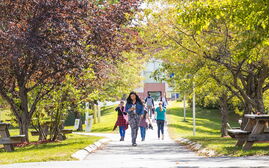Maine Community College System president calls for investment in Maine workers
 Courtesy / Southern Maine Community College
Students at Southern Maine Community College work in one of many workforce development programs offered by the system. Maine Community College President David Daigler told the Legislature Thursday more work needs to be done to close the workforce skills gap.
Courtesy / Southern Maine Community College
Students at Southern Maine Community College work in one of many workforce development programs offered by the system. Maine Community College President David Daigler told the Legislature Thursday more work needs to be done to close the workforce skills gap.
Maine Community College System’s new president, David Daigler called for additional investment in Maine workers in his State of the Community Colleges biannual address to a joint session of the Legislature Thursday.
Noting that demand for skilled labor across Maine exceeds supply, Daigler encouraged lawmakers to invest in the “responsive, efficient, and relevant” education and training available at Maine’s seven community colleges, according to a news release.
Daigler said that community colleges don’t have the capacity to deliver on the demand.
Programs, partnerships and other educational pathways underway across the community college system are designed to address a growing demand for skilled workers in the state’s key industries.
“A responsive community college needs to develop new ways to deliver higher education when students need it, where students can access it, and in a form that truly improves an individual’s ability to advance his or her career,” he said.
The state’s community colleges educate 35% of students enrolled in Maine’s public colleges and universities, with 24% of the state’s higher education budget, he said. He stressed the need to provide far more Maine people with access to higher education and training.
“There are tens of thousands of Mainers who lack the skills and education they need to fully compete in this economy,” he said.
'Seismic changes'
There are three “seismic” changes driving new approaches to how the system delivers programming, Daigler said:
• The workplace is increasingly automated and moving up or even getting a job in many cases requires a technical education.
• Even with increased automation in the workplace, businesses are starving for qualified workers. Demand for skilled labor exceeds supply. Orders are going unfilled, back orders are growing, and Maine’s economy is losing ground.
• Today’s “point, click and deliver society” drives expectation of what, where and when people receive goods and services.
“Those three forces present enormous challenges for those of us charged with educating Maine people and preparing a skilled workforce,” he said.
Initiatives underway include:
• Focus on the 38% of Maine students who don’t attend college right after high school, through Embark, a high school-to-college transition program.
• Foundation for Maine’s Community Colleges secured a $3.6 million grant from the Harold Alfond Foundation and a $400,000 grant from the KeyBank Foundation to strengthen programming for adult students.
• Through increases in state appropriation provided by the 128th Legislature, investment in more than a dozen high-demand-occupation programs across the state.
• Compressing the traditional semester schedule to offer start and end dates that better align with seasonal needs of certain industries, such as hospitality and construction.
• Establishment of regional delivery centers for commercial truck driving.
• The John T. Gorman Foundation and Lisa Gorman have provided funding for “Navigating Success,” a program that places student counselors at each college.
• Implementation of Math Pathways to help students develop mathematics skills..
In addition, he said, the system has had discussions with the Maine Department of Education about building educational programs in the correctional system; is working with the Department of Labor to build workforce with skills training; and is building new pathways to career readiness and continuous professional development through micro-credential badges.
Daigler has been with the system for more than 19 years and has been the system's vice president and chief financial officer before succeeding Derek P. Langhauser as president in January. Langhauser is now chief legal counsel to Gov. Janet Mills.
The Maine Community College System comprises seven community colleges and six off-campus centers that serve more than 25,000 students a year through degree programs, credit and noncredit courses, and customized training.














0 Comments